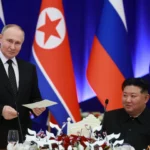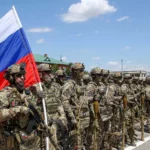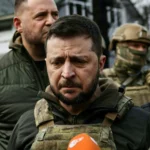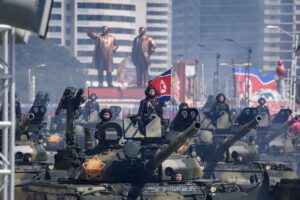War’s supporters turn up criticism of Kremlin and military leaders as failures spill on to TV screens at home
After Russia’s chaotic retreats in Kherson – less than a week after Vladimir Putin illegally annexed the Ukrainian province alongside three others – the region’s Moscow-appointed governor, Kirill Stremousov, sought to calm the mood.
Far from a rout, the withdrawal was a tactical “regrouping” to “deliver a retaliatory blow”, Stremousov said on Wednesday.
His comments – among the first public admissions of Russia’s retreats in Kherson – attempted to mask what even many vocal supporters of the war now say: the situation is the most dire the Russian army has found itself in since the start of the invasion seven months ago.
“Friends, I know you’re waiting for me to comment on the situation. But I really don’t know what to say to you. The retreat … is catastrophic,” Roman Saponkov, a prominent war correspondent, wrote on his Telegram channel, describing his despair over the pullback in Kherson.

The extent of Russia’s retreat remains unclear for now. During his nightly address on Tuesday, Ukraine’s president, Volodymyr Zelenskiy, said: “The Ukrainian army is making quite fast and powerful movements in the south of our country.” He named eight small towns in Kherson that had recently been recaptured.
When asked by journalists on Wednesday whether there was a contradiction between Russia’s annexation rhetoric and the reality on the ground, the Kremlin spokesperson Dmitry Peskov said there was none whatsoever. The territories “will be with Russia forever and they will be returned”, he added.
No such confidence could be felt, however, among the pro-war military bloggers and journalists, an increasingly vocal group with frontline contacts and millions of readers that have taken to criticising the Kremlin for its failure to achieve its goals.
They paint a bleak picture of deteriorating Russian morale, blaming a lack of rotation and army exhaustion for the failings in southern Ukraine.
“I get criticised for driving people into depression with my news … well, the time is such, there will be no good news from the near future,” wrote Aleksandr Kots, a pro-Kremlin journalist who travels with with the Russian army, on Tuesday.
“We do not have enough people … fatigue has set in … there is no longer any strength left to hold on to the territories won.”
On the day Putin announced his so-called “partial mobilisation” last month, the contracts of soldiers fighting in Ukraine were also automatically extended indefinitely. That decision has denied many who have been fighting since February a way out of the war.
“We get hundreds of requests every day from soldiers who want to find a way to cancel their contracts,” said one military lawyer who asked to speak anonymously, for fear of infringing Russian laws that criminalise “fake” news about the military.
“Most soldiers had no idea they were going to Ukraine when the war started. They were hoping to get out once their contracts expired. Now that’s simply not possible any more.”
Russia’s surrender of Lyman, a strategically important city in the north of the Donetsk region, had already led to rare public criticism of senior military leadership from several top officials.

“I do not know what the defence ministry reports to [Putin], but in my personal opinion, more drastic measures should be taken,” wrote the Chechen leader Ramzan Kadyrov.
The Russian army has sought to play down Saturday’s retreat from Lyman as a minor military setback during which it had inflicted heavy casualties on Ukrainian troops in the fight for the city.
But according to an investigation by BBC News Russia, one of Russia’s most elite military intelligence units suffered high casualties during that retreat. The 3rd Guards Spetsnaz Brigade has now lost up to three-quarters of its reconnaissance force since the start of the war, the BBC service claimed.
The latest military failures, seemingly too big to ignore, have also now spilled on to Russian television screens.
“Why do we advance metre by metre when they advance village by village?” Olga Skabeyeva, the country’s top state-TV host, angrily asked Andrei Marochko, a Russia-appointed official in Luhansk, in a recent broadcast.
The Kremlin will hope the first mobilisation drive announced last month will soon be able to stem the losses.

The Russian defence minister, Sergei Shoigu, said on Tuesday that 200,000 men had already been mobilised and were at 80 training grounds and six training centres across Russia.
The defence ministry also published slick videos of recruits being trained by soldiers, accompanied by other footage showing them arriving in Russian-controlled areas of Luhansk where they were greeted by cheerful locals.
But a government propaganda campaign has not prevented the mobilisation drive from sparking chaos and anger across Russia. That anger increased after videos emerged that showed scores of men being subjected to poor conditions at training centres as they waited to be sent to Ukraine.
At least six recruits have died in training centres since the start of the mobilisation, Pavel Chikov, one of Russia’s leading human right lawyers, said on Tuesday. One of the recruits reportedly killed himself.
In arguably the most embarrassing mobilisation video to date for the Kremlin, a group of mobilised soldiers from the Siberian Omsk region are seen appealing to the authorities for the pay promised by the government for participating in the war. “We are ready to go. But please help us, help our families,” one of them said.
Source: The Guardian















